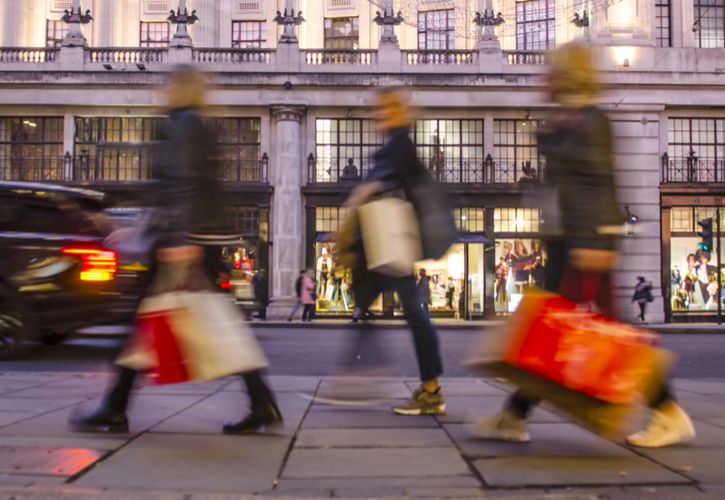UK DIY News
Barclaycard: DIY & Home Improvement Spend Sees Significant Growth In March

- Spending on essential items grew 7.7 per cent compared to 2019, bolstered by strong growth in food and drink specialist stores
- While spending on non-essentials dropped 14.5 per cent, spending on accommodation and entertainment showed signs of improvement as Brits began to book post-lockdown trips and activities
- Ecommerce continued to surge across multiple categories, with triple-digit growth recorded in online spending for grocery, eating & drinking, and general retail
- Starting this month, all growth calculations have moved to a two-year comparison, to provide a more realistic view of the UK’s long-term recovery from the impact of coronavirus*
- The Barclaycard report combines hundreds of millions of customer transactions with consumer research to provide an in-depth view of UK spending
Consumer spending fell 7.2 per cent in March compared to the same period in 2019, as lockdown continued. However, spending on hotels, resorts and accommodation, as well as entertainment, showed early signs of improvement as Brits began to make plans for when restrictions are lifted.
Data from Barclaycard, which sees nearly half of the nation’s credit and debit card transactions, reveals that spending on essential items grew 7.7 per cent compared to March 2019, the highest growth so far this year. This was bolstered by food and drink specialist stores – including butchers, greengrocers, fresh food boxes and meal-kit products – which saw a 71.4 per cent uplift, as Brits relied on the convenience of local shops and delivery services for their weekly meals.
Supermarket shopping rose 21.9 per cent overall, with online grocery spend surging 116.5 per cent, as home deliveries for food shopping remained in high demand.
While non-essential spend was down 14.5 per cent compared to 2019, this represents a slight improvement compared to the previous two months of lockdown, with January and February seeing declines of 20.8 per cent and 18.3 per cent when compared to 2019.
With many brick-and-mortar shops remaining closed, clothing contracted 28.6 per cent compared to the same period in 2019; the largest two-year drop recorded in the category since May 2020. Meanwhile, the hospitality sector continued to be hit hard by the restrictions, as bars and pubs as well as restaurants saw declines of 94.8 per cent and 83.1 per cent respectively.
However, there are signs that spending at restaurants should improve after further easing of restrictions on 12th April, as one in four Brits (26 per cent) have already been booking post-lockdown activities, with 41 per cent of these consumers booking restaurant reservations for meals outdoors. On the other hand, ordering takeaways online proved as popular as ever, with the eating and drinking category recording a 128.5 per cent surge in online spend.
There was also a glimmer of hope for the travel industry; the 54.3 per cent decline in spending on hotels, resorts and accommodation was an improvement on the respective 75.4 per cent and 70.3 per cent declines seen in January and February, suggesting that holidaymakers have started to book trips for later in the year. This comes as over two fifths of Brits (41 per cent) say they are planning a vacation in the UK in 2021, rather than hoping for an overseas trip. Of these UK-bound holidaymakers, 41 per cent are planning to spend more than they normally would travelling abroad.
In another sign that consumers are making plans to look forward to after lockdown, entertainment – which includes leisure activities such as family days out, theme parks and gym memberships – also saw an improvement in spending, declining 57.9 per cent compared to 83.2 per cent last month. Spending at sports & outdoor retailers also recovered slightly, dropping just 5.9 per cent compared to 11.7 per cent in February, as Brits prepare to spend more time outside as the spring weather arrives.
Despite declines seen across a number of categories, some sectors saw particularly strong uplifts in March. When compared to figures two years ago, home improvements and DIY rose 34.4 per cent – the highest growth in the category since July 2020 – as more households bought items to prepare their homes and gardens for the warmer months.
Retail spend grew 17.9 per cent overall, thanks largely to the continued rise of ecommerce – online retail transactions increased 84.7 per cent compared to 2019, accounting for 51.6 per cent of all retail spend in March. Furthermore, online general retailers – such as online marketplaces and catalogue shops – increased 110.0 per cent, and online specialist retailers – including florists and jewellery stores – saw 95.7 per cent growth, as Brits bought presents for Mother’s Day.
Confidence in the UK economy remains at 28 per cent, although some consumers are sceptical about the UK’s longer-term prospects, with six in 10 (61 per cent) expecting the lifting of lockdown restrictions to be short-lived and that there will be another lockdown in the UK before the end of the year.
On the other hand, the number of Brits feeling upbeat about their household finances rose from 68 per cent last month to 72 per cent in March. Almost two thirds (61 per cent) are feeling confident about their ability to spend on non-essential items – the highest proportion since before the pandemic began – and almost half (47 per cent) are feeling upbeat about their job prospects.
Raheel Ahmed, Head of Consumer Products, said: “With springtime finally here and restrictions starting to ease, it’s encouraging to see a renewed sense of optimism across much of the UK. There are also signs that some of those sectors most heavily impacted by the pandemic, such as hotels, resorts, accommodation and entertainment, are beginning to turn a corner, as many look forward to long-awaited trips and activities with family and friends after lockdown.
As Brits spent March sprucing up their homes and garden in preparation for warmer weather, DIY stores also enjoyed significant growth. While it remains a very challenging environment for high-street and hospitality outlets, the fact that many consumers are making plans for the future is a positive sign, and we hope to see this pent-up demand lead to growth in more categories as life after lockdown starts to resume.”
Source : Barclaycard
I find the news and articles they publish really useful and enjoy reading their views and commentary on the industry. It's the only source of quality, reliable information on our major customers and it's used regularly by myself and my team.











































